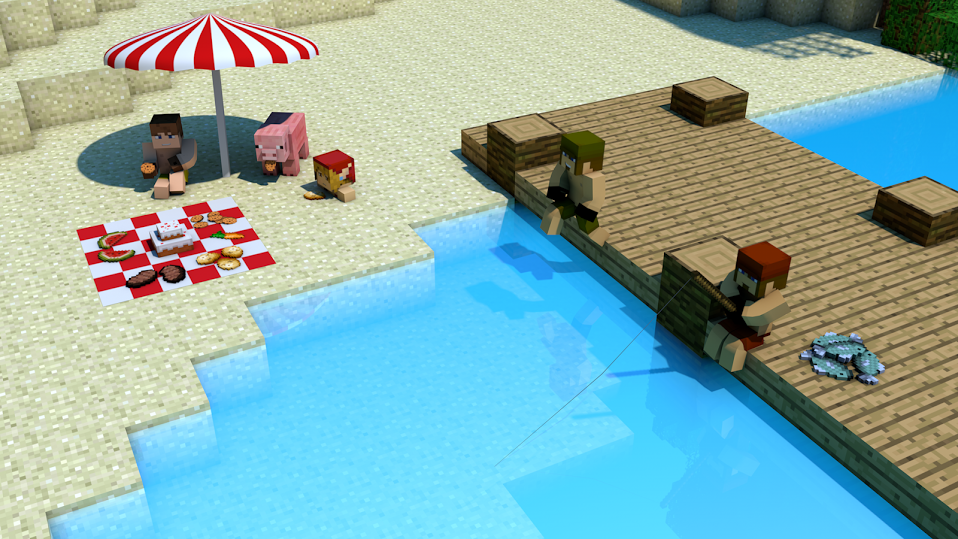
Section Branding
Header Content
For The Tech World, Summertime Is Anything But Lazy
Primary Content

The lazy dog days of summer are fast approaching, and vacations are looming on the horizon for many of you. Not so for GPB’s sci-tech correspondent, Renay San Miguel. Three separate tech stories have his attention this week – one involving a major company and Georgia, another that could change how we listen to music online..and yet another involving two games that your kids are probably playing more of during their summer vacations. He talks about these stories with GPB’s Bradley George.
· Let’s start with this week’s news that Google is expanding its existing data center in Douglas County. They’re going to spend more than $300 million to add about 25 more jobs to the 300-plus employees already there. Why does Google need to do this?
Data centers are really Google’s nerve centers. Among other things, they’re storage repositories for data like your Gmails, for the billions of hours worth of YouTube videos uploaded each minute, and for all the Google Apps that businesses use. But Google also has big plans for mobile and wearable technology and cloud computing, so they’ll need more capacity over the next few years. To do that, they’re spending that money to build an expansion to their existing data center in Lithia Springs, which is one of only 13 Google data centers in the world.
· Google also has big plans for Atlanta, as we saw earlier this year with the Google Fiber announcement. How does all this translate into economic impact for Georgia?
Google estimates that it was responsible for about $2.4 billion in economic activity in Georgia in 2013. It also says some 54,000 state businesses are using Google’s online advertising services. The company already has a big sales office in Midtown and is supposedly wanting to move some people into Ponce City Market. You have all these Fortune 500 companies based in Atlanta and all the entrepreneurs starting up their businesses, and they’re all going to need everything from cloud storage to Google Fiber high-speed networking to online ad tools. Google sees Atlanta and the Southeast as a very target-rich environment.
· There’s another top-dog tech company that’s planning on making some news soon. Apple’s Worldwide Developers Conference is next week and there’s talk it may announce a new streaming music service. Should the folks at Spotify and Pandora be worried?
They should be afraid, be very afraid. You hear the term “game changer” used an awful lot, but Apple’s iTunes really did change the game for the music industry back in 2003. It ushered in easy to download, affordable music on an a la carte basis, and impacted sales of CDs from publishers and revenue for music stores like Tower Records. Now they’re supposedly looking to introduce their own streaming service that plays off their acquisition of Dr. Dre’s Beats Music company. Apple laid the foundation for online music, it has a formidable existing service, and if they can convince a sizable number of their estimated 110 million iTunes buyers to spend a reported 10 bucks a month to stream music instead of download it per song or album, that will validate streaming and give Spotify, now the top name in streaming, a big competitor to worry about.
· And finally, Lego has announced it’s coming out with its own video game to take on the very popular Minecraft game. But aren’t Lego and Minecraft kind of business partners?
They are. Lego makes Minecraft sets, which I know for a fact because my soon to be 9 year old son had one on his Christmas list. In fact this announcement sounds like it comes direct from the fever dreams of every 9 year old boy and girl out there who’s crazy about both products. Minecraft is basically Lego; it’s building your own world, one block at a time, only in digital form. They’re both about creating and building and engineering. Lego’s version is called Lego Worlds and is streaming right now on the Steam platform as a way to beta test it. The regular version along with real-world playsets and mini-figures will come out next year. From what I’ve read, Lego’s braintrust respects Minecraft and vice versa. If anything, this could prompt Microsoft, which bought Minecraft last year, to pursue new strategies or products, which would make all 9 year olds happy while draining their parents’ wallets.
Renay San Miguel hosts Sci-Tech Now: Georgia on GPB-TV. Follow Renay on Twitter or read his blog for the latest tech news.
Tags: sci-tech now, Google, Apple, minecraft, Lego
